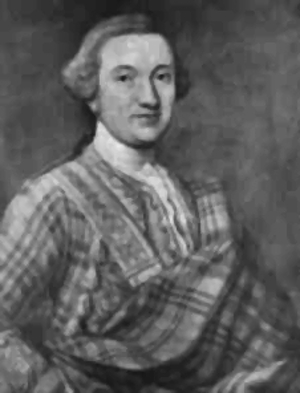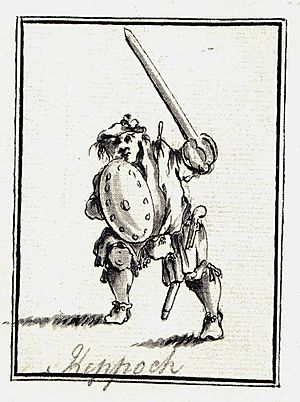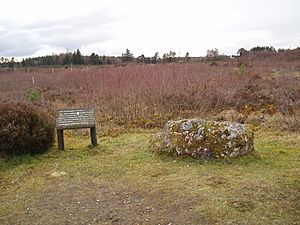Alexander Macdonald, 17th of Keppoch facts for kids
Quick facts for kids
Alexander Macdonald of Keppoch
|
|
|---|---|

Portrait dated 1765, said to be of Alexander Macdonald, formerly owned by the descendants of a daughter of his cousin Major Donald Macdonald of Tir na Dis, near Spean Bridge
|
|
| Born | c. 1695 |
| Died | 16 April 1746 Drumossie Moor, Inverness |
| Cause of death | Killed at Battle of Culloden |
| Title | 17th of Keppoch |
| Tenure | 1729–1746 |
| Nationality | Scottish |
| Residence | Keppoch House, Roybridge |
| Wars and battles | 1715 Jacobite Rising Sheriffmuir |
| Offices | Colonel, Macdonald of Keppoch's Regiment 1745-1746 |
| Spouse(s) | Isobel Stewart |
| Issue | Ranald (-1788); Alasdair (-1809); Angus 'Ban' (1725-1815) |
| Parents | Coll Macdonald; Barbara Macdonald |
|
|
|
Alexander Macdonald, 17th of Keppoch (died 1746) was a Scottish Jacobite leader and a clan chief. He took part in two major uprisings in Scotland. These were the 1715 and 1745 Jacobite risings. He was killed at the Battle of Culloden. At Culloden, he was leading a group of soldiers. Most of these soldiers were from his own clan, the MacDonalds of Keppoch. In Scottish Gaelic, his clan was called Clann Dòmhnaill na Ceapaich.
Contents
Life of Alexander Macdonald
Alexander Macdonald was the son of Coll Macdonald, who was the 16th chief of Keppoch. His mother was Barbara, daughter of Sir Donald Macdonald of Sleat. His aunt, Sìleas na Ceapaich, was a famous poet. Alexander studied at the University of Glasgow around 1713. This suggests he was born in the late 1690s.
His family had long supported the House of Stuart. This support dated back to the Civil War. During that time, the 12th chief, Donald 'Glas', fought with Montrose. In 1715, Alexander joined his father in an uprising. They supported James, who wanted to be king. Alexander fought at the Battle of Sheriffmuir.
After this uprising failed, Alexander went to France. Many Scots who supported the Stuarts also went there. He gained experience in the French army and became a captain. He later returned to Scotland. His father likely died around 1729. In that year, Alexander became the new chief of Keppoch.
As chief, Alexander believed in an old tradition. He thought that his tenants should provide military service instead of paying rent. In 1740, he said his estates were worth "five hundred men" in terms of soldiers. He stayed in touch with the exiled Stuart family. In 1743, he was given the title of baronet by the Jacobite court.
Alexander married Isabel, daughter of Robert Stewart of Appin. They had several children. A painting of him was made in 1765, after he died. People who knew him during the 1745 uprising described him. They said he was a "Man of an austere aspect, tall, lusty and strong". They also noted he was "much inur'd to War, and can endure any Hardships".
The 1745 Jacobite Rising
Alexander Macdonald of Keppoch was one of the first to join Charles Edward Stuart in 1745. Charles, also known as Bonnie Prince Charlie, arrived in Scotland without the French help he had promised. Many Scottish Jacobites were worried and wanted him to leave. But Alexander and Donald Cameron of Lochiel decided to join him. Their support in early August made the uprising possible.
Alexander supposedly felt it was his duty to protect Charles once he landed. However, he also faced money problems. Some reports suggest he considered joining the government army to save his lands.
Because Alexander had military experience from France, he was an important member of the Jacobite Council of War. This group advised on battle plans. His own regiment was made up of his tenants from Lochaber. It also included some men from Glen Coe and other clans. This regiment fought throughout the uprising.
His regiment had about 300 men when the uprising began. But some men left soon after due to a disagreement. Some reports say Alexander had to force tenants to join him. He was said to have threatened them if they did not.
Keppoch's men were involved in the first small fight of the uprising. This happened when they surprised Captain John Scott's soldiers near Fort William on August 16. Alexander and another chief later went to Dundee. There, they collected money and captured government weapons.
His regiment then marched south into England. They fought in a night battle at Clifton on December 18. Later, with about 500 men, they played a big part in the Battle of Falkirk Muir. Some prisoners later claimed that Alexander had forced more men to join his ranks in March 1746.
In March 1746, Alexander and Lochiel wrote a letter together. They spoke out against the harsh treatment of civilians by the pro-Government Campbell militia. They said they were horrified by such cruelty. They threatened to punish those who burned houses.
Culloden Battle
By April 1746, the Jacobites were low on money and supplies. Their leaders decided that a big battle at Culloden was their best choice. Keppoch's regiment had been fighting at Fort William. They rejoined the main army the day before the battle. They took part in an unsuccessful night attack on the government camp.
The next morning, Keppoch's men were on the left side of the Jacobite army. They had to charge into heavy musket fire and cannon shots. A famous story says that Keppoch saw his men hesitate. He then shouted, Mo Dhia, an do thrèig clann mo chinnidh mi? This means, "My God, have the children of my clan forsaken me?" He then charged forward alone with his pistol and sword.
However, other accounts say that Keppoch led the attack with a small group of family members around him. His other men followed behind. During the charge, a musket ball shattered his right arm. He was then hit in the chest. He died later while his illegitimate son, Aonghas Bàn, carried him off the field. His regiment tried to fight back against the government cavalry. But they suffered many losses and scattered after the Jacobite defeat.
Alexander's brother Donald and nephew John Mackenzie also died at Culloden. Another brother, Archibald, had been killed earlier at the Battle of Prestonpans. Alexander was succeeded as chief by his son Ranald.
How Alexander Macdonald is Remembered
People have had different opinions about Alexander Macdonald. These opinions often depended on how they felt about the Jacobite cause. One of his colleagues, James Johnstone, called him "a gentleman of uncommon merit". He said Alexander was "universally lamented" (missed by everyone).
However, a pamphlet from 1746 described him as "a man dreaded, but not beloved". It also said he "slept in the open fields in his Plaid" during the uprising. On the other hand, a Macdonald family history from the 1800s described him as "an amiable and gallant man". It said he "endeared himself to all ranks" (made everyone like him).
In Film
Alexander Macdonald of Keppoch is shown in the 1964 film Culloden. He is played by George McBean. Several men from his regiment are also featured in the movie.
 | Lonnie Johnson |
 | Granville Woods |
 | Lewis Howard Latimer |
 | James West |



